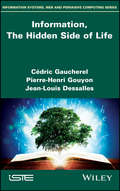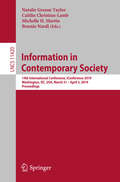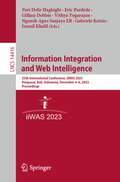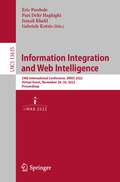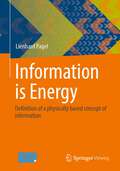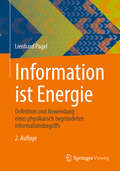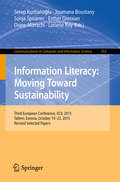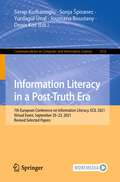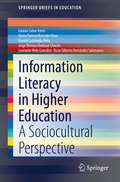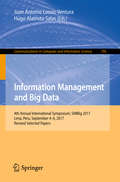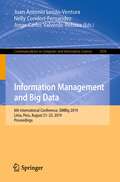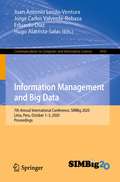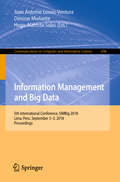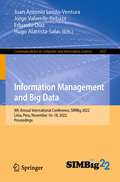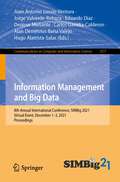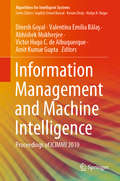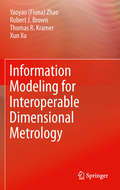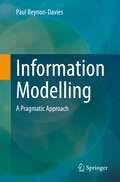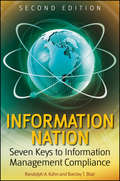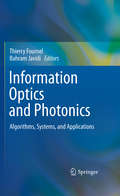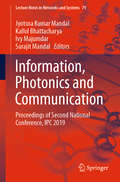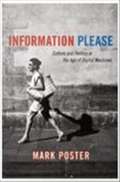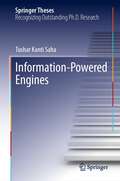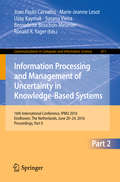- Table View
- List View
Information, The Hidden Side of Life
by Cédric Gaucherel Pierre-Henri Gouyon Jean-Louis DessallesThis book explores the unity of life. It proposes that the concept of information is the inner essence of what we today call life. The importance of information for our species is obvious. Human beings are highly dependent on information, constantly exchanging with conspecifics. In a less apparent way, we are the product of genetic and epigenetic information which determines our development in a given environment from a fertilized egg to the adult stage. Even less apparent is that information plays a determining role in ecosystems. This observation may include the prebiotic systems in which life emerged. Our claim is that Nature processes information continuously. This means that even beyond living entities, we can see messages and decoding procedures. Nature can be said to send messages to its own future and then to decode them. Nature “talks” to itself! The systematic organization of messages suggests that, in some respects, we should even speak of the “languages” of Nature.
Information in Contemporary Society: 14th International Conference, iConference 2019, Washington, DC, USA, March 31–April 3, 2019, Proceedings (Lecture Notes in Computer Science #11420)
by Natalie Greene Taylor Caitlin Christian-Lamb Michelle H. Martin Bonnie NardiThis book constitutes the proceedings of the 14th International Conference on Information in Contemporary Society, iConference 2019, held in Washington, DC, USA, in March/April 2019. The 44 full papers and 33 short papers presented in this volume were carefully reviewed and selected from 133 submitted full papers and 88 submitted short papers. The papers are organized in the following topical sections: Scientific work and data practices; methodological concerns in (big) data research; concerns about “smart” interactions and privacy; identity questions in online communities; measuring and tracking scientific literature; limits and affordances of automation; collecting data about vulnerable populations; supporting communities through public libraries and infrastructure; information behaviors in academic environments; data-driven storytelling and modeling; online activism; digital libraries, curation and preservation; social-media text mining and sentiment analysis; data and information in the public sphere; engaging with multi-media content; understanding online behaviors and experiences; algorithms at work; innovation and professionalization in technology communities; information behaviors on Twitter; data mining and NLP; informing technology design through offline experiences; digital tools for health management; environmental and visual literacy; and addressing social problems in iSchool research.
Information Integration and Web Intelligence: 25th International Conference, iiWAS 2023, Denpasar, Bali, Indonesia, December 4–6, 2023, Proceedings (Lecture Notes in Computer Science #14416)
by Pari Delir Haghighi Eric Pardede Gillian Dobbie Vithya Yogarajan Ngurah Agus Sanjaya ER Gabriele Kotsis Ismail KhalilThis book constitutes the refereed conference proceedings of the 25th International Conference on Information Integration and Web Intelligence, iiWAS 2023, organized in conjunction with the 21st International Conference on Advances in Mobile Computing and Multimedia Intelligence, MoMM2023, held in Denpasar, Bali, Indonesia, during December 4-6, 2023.The 24 full papers and 24 short papers presented in this book were carefully reviewed and selected from 96 submissions. The papers are divided into the following topical sections: business data and applications; data management; deep and machine Learning; generative AI; image data and knowledge graph; recommendation systems; similarity measure and metric; and topic and text matching.
Information Integration and Web Intelligence: 24th International Conference, iiWAS 2022, Virtual Event, November 28–30, 2022, Proceedings (Lecture Notes in Computer Science #13635)
by Eric Pardede Pari Delir Haghighi Ismail Khalil Gabriele KotsisThis volume includes the papers presented at the 24th International Conference on Information Integration and Web Intelligence (iiWAS 2022), organized in conjunction with 24th International Conference on Advances in Mobile Computing & Multimedia Intelligence (MoMM2022).The dominant research focus of submitted papers was artificial intelligence and machine learning. The accepted papers presented advances and innovations in an array of areas such as internet of things, virtual and augmented reality, various business applications. iiWAS 2022 attracted 97 papers, from which the Program Committee selected 26 regular papers and 25 short papers.Due to safety concerns as well as other restrictions preventing travel and gatherings, it was decided to organize iiWAS 2022 as a virtual conference.
Information is Energy: Definition of a physically based concept of information
by Lienhard PagelAn objective, dynamic and physically justified concept of information is elaborated starting from Shannon's concept of entropy and applied to information technology, artificial intelligence (consciousness) and thermodynamics. The justification of an information conservation theorem acquires practical significance in information technology, especially as it moves into the quantum realm (photonics/quantum computing). The unconditional dynamics of information and its objectivity are critically examined and are the foundations of the considerations. We live in the information age, but the concept of information is still not defined objectively and physically. This book defines a dynamic concept of information that results in a conservation of information principle. Just as the principle of conservation of energy is essential to understanding energy, the principle of conservation of information leads to a deeper understanding of information. Information is strongly related to entropy, always in motion, cannot disappear, and is independent of subjects.
Information ist Energie: Definition und Anwendung eines physikalisch begründeten Informationsbegriffs
by Lienhard PagelEin objektiver, dynamischer und physikalisch begründeter Informationsbegriff wird ausgehend vom Shannonschen Entropiebegriff erarbeitet und auf die Informationstechnik, die künstliche Intelligenz (Bewusstsein) und die Thermodynamik angewandt. Die Begründung eines Informationserhaltungssatzes erhält praktische Bedeutung in der Informationstechnik, insbesondere wenn sie in den Bereich der Quanten (Photonik/Quantencomputing) vordringt. Die unbedingte Dynamik von Information und deren Objektivität werden kritisch untersucht und sind die Grundlagen der Betrachtungen.
Information Literacy: Third European Conference, ECIL 2015, Tallinn, Estonia, October 19-22, 2015, Revised Selected Papers (Communications in Computer and Information Science #552)
by Serap Kurbanoğlu Joumana Boustany Sonja Špiranec Esther Grassian Diane Mizrachi Loriene RoyThis book constitutes the refereed proceedings of the Third European Conference on Information Literacy, ECIL 2015, held in Tallinn, Estonia, in October 2015. The 61 revised full papers presented were carefully reviewed and selected from 226 submissions. The papers are organized in topical sections on information literacy, environment and sustainability; workplace information literacy and knowledge management; ICT competences and digital literacy; copyright literacy; other literacies; information literacy instruction; teaching and learning information literacy; information literacy, games and gamification; information need, information behavior and use; reading preference: print vs electronic; information literacy in higher education; scholarly competencies; information literacy, libraries and librarians; information literacy in different context.
Information Literacy in a Post-Truth Era: 7th European Conference on Information Literacy, ECIL 2021, Virtual Event, September 20–23, 2021, Revised Selected Papers (Communications in Computer and Information Science #1533)
by Serap Kurbanoğlu Sonja Špiranec Yurdagül Ünal Joumana Boustany Denis KosThis book constitutes the refereed post-conference proceedings of the 7th European Conference on Information Literacy, ECIL 2021, held in online mode in September 2021.The 61 revised papers included in this volume were carefully reviewed and selected from 192 submissions. The papers are organized in the topical sections on information literacy in a post-truth era and news literacy; health literacy; data literacy; digital literacy and digital empowerment; other literacies; information literacy in different contexts; information literacy education in different sectors; information literacy instruction; assessment and evaluation of information literacy; academic integrity, plagiarism and digital piracy; information behaviour; information literacy, libraries and librarians; information literacy in different cultures and countries; information literacy and democracy, citizenship, active participation.
Information Literacy in Higher Education: A Sociocultural Perspective (SpringerBriefs in Education)
by Fabiola Cabra-Torres Gloria Patricia Marciales Vivas Harold Castañeda-Peña Jorge Winston Barbosa-Chacón Leonardo Melo González Oscar Gilberto Hernández SalamancaThis book presents an innovative theoretical and methodological approach to study information literacy in higher education contexts. While mainstream studies tend to see information literacy as a technical and universal process, this book proposes a theoretical and methodological framework to study information literacy from a sociocultural perspective, highlighting the importance of the social and cultural contexts in which information literacy develops.This situated approach demands that research data must be analysed in relation to the contexts in which they emerge, so the book proposes a research method based on the study of personal histories and stories, learning situations and intersubjective relationships to characterize the different information profiles of different information users. Adopting a multidisciplinary approach that combines contributions from educational research, psychology and information sciences, the authors first present a theoretical discussion to argue in favor of the sociocultural paradigm to study information literacy, then present their methodological proposal to observe informational competencies among higher education students, and finally present the results of an empirical study to identify different information literacy profiles among Latin American students and teachers.Breaking with the hegemonic paradigm in the field, Information Literacy in Higher Education – A Sociocultural Perspective provides useful and innovative tools to researchers working in different areas of the social sciences, such as education, psychology, linguistics and information sciences.
Information Management and Big Data: Second Annual International Symposium, Simbig 2015, Cusco, Peru, September 2-4, 2015, And Third Annual International Symposium, Simbig 2016, Cusco, Peru, September 1-3, 2016, Revised Selected Papers (Communications In Computer And Information Science #656)
by Hugo Alatrista-Salas Juan Antonio Lossio-VenturaThis book constitutes the refereed proceedings of the 4th Annual International Symposium on Information Management and Big Data, SIMBig 2017, held in Lima, Peru, in September 2017.The 10 revised full papers presented were carefully reviewed and selected from 71 submissions. The papers address issues such as Data Science, Big Data, Data Mining, Natural Language Processing, Text Mining, Information Retrieval, Machine Learning, Semantic Web, Ontologies, Web Mining, Knowledge Representation and Linked Open Data, Social Web and Web Science, Information Visualization.
Information Management and Big Data: 6th International Conference, SIMBig 2019, Lima, Peru, August 21–23, 2019, Proceedings (Communications in Computer and Information Science #1070)
by Juan Antonio Lossio-Ventura Nelly Condori-Fernandez Jorge Carlos Valverde-RebazaThis book constitutes the refereed proceedings of the 6th International Conference on Information Management and Big Data, SIMBig 2019, held in Lima, Peru, in August 2019.The 15 full papers and 16 short papers presented were carefully reviewed and selected from 104 submissions. The papers address issues such as data mining, artificial intelligence, Natural Language Processing, information retrieval, machine learning, web mining.
Information Management and Big Data: 7th Annual International Conference, SIMBig 2020, Lima, Peru, October 1–3, 2020, Proceedings (Communications in Computer and Information Science #1410)
by Juan Antonio Lossio-Ventura Jorge Carlos Valverde-Rebaza Eduardo Díaz Hugo Alatrista-SalasThis book constitutes the refereed proceedings of the 7th International Conference on Information Management and Big Data, SIMBig 2020, held in Lima, Peru, in October 2020.*The 32 revised full papers and 7 revised short papers presented were carefully reviewed and selected from 122 submissions. The papers address topics such as natural language processing and text mining; machine learning; image processing; social networks; data-driven software engineering; graph mining; and Semantic Web, repositories, and visualization. *The conference was held virtually.
Information Management and Big Data: 5th International Conference, SIMBig 2018, Lima, Peru, September 3–5, 2018, Proceedings (Communications in Computer and Information Science #898)
by Juan Antonio Lossio-Ventura Denisse Muñante Hugo Alatrista-SalasThis book constitutes the refereed proceedings of the 5th International Conference on Information Management and Big Data, SIMBig 2018, held in Lima, Peru, in September 2018. The 34 papers presented were carefully reviewed and selected from 101 submissions. The papers address issues such as data mining, artificial intelligence, Natural Language Processing, information retrieval, machine learning, web mining.
Information Management and Big Data: 9th Annual International Conference, SIMBig 2022, Lima, Peru, November 16–18, 2022, Proceedings (Communications in Computer and Information Science #1837)
by Juan Antonio Lossio-Ventura Jorge Valverde-Rebaza Eduardo Díaz Hugo Alatrista-SalasThis book constitutes the refereed proceedings of the 9th Annual International Conference on Information Management and Big Data, SIMBig 2022, held in Lima, Peru, during November 16–18, 2022.The 18 full papers and 1 short paper included in this book were carefully reviewed and selected from 50 submissions. The volume presented novel methods for the analysis and management of large data, in fields like Artificial Intelligence (AI), Data Science, Machine Learning, Natural Language Processing, Semantic Web, Data-driven Software Engineering, Health Informatics.
Information Management and Big Data: 8th Annual International Conference, SIMBig 2021, Virtual Event, December 1–3, 2021, Proceedings (Communications in Computer and Information Science #1577)
by Juan Antonio Lossio-Ventura Jorge Valverde-Rebaza Eduardo Díaz Denisse Muñante Carlos Gavidia-Calderon Alan Demétrius Baria Valejo Hugo Alatrista-SalasThis book constitutes the refereed proceedings of the 8th International Conference on Information Management and Big Data, SIMBig 2021, held as a virtual event in December 2021. The 25 revised full papers and 2 revised short papers presented were carefully reviewed and selected from 67 submissions. The papers are organized in topical sections on data mining and applications; deep learning and applications; data-driven software engineering; health, NLP, and social media; image processing, machine learning, and semantic web.
Information Management and Machine Intelligence: Proceedings of ICIMMI 2019 (Algorithms for Intelligent Systems)
by Dinesh Goyal Valentina Emilia Bălaş Abhishek Mukherjee Victor Hugo C. de Albuquerque Amit Kumar GuptaThis book features selected papers presented at the International Conference on Information Management and Machine Intelligence (ICIMMI 2019), held at the Poornima Institute of Engineering & Technology, Jaipur, Rajasthan, India, on December 14–15, 2019. It covers a range of topics, including data analytics; AI; machine and deep learning; information management, security, processing techniques and interpretation; applications of artificial intelligence in soft computing and pattern recognition; cloud-based applications for machine learning; application of IoT in power distribution systems; as well as wireless sensor networks and adaptive wireless communication.
Information Modeling for Interoperable Dimensional Metrology
by Y Zhao Robert Brown T Kramer Xun XuDimensional metrology is an essential part of modern manufacturing technologies, but the basic theories and measurement methods are no longer sufficient for today's digitized systems. The information exchange between the software components of a dimensional metrology system not only costs a great deal of money, but also causes the entire system to lose data integrity. Information Modeling for Interoperable Dimensional Metrology analyzes interoperability issues in dimensional metrology systems and describes information modeling techniques. It discusses new approaches and data models for solving interoperability problems, as well as introducing process activities, existing and emerging data models, and the key technologies of dimensional metrology systems. Written for researchers in industry and academia, as well as advanced undergraduate and postgraduate students, this book gives both an overview and an in-depth understanding of complete dimensional metrology systems. By covering in detail the theory and main content, techniques, and methods used in dimensional metrology systems, Information Modeling for Interoperable Dimensional Metrology enables readers to solve real-world dimensional measurement problems in modern dimensional metrology practices.
Information Modelling: A Pragmatic Approach
by Paul Beynon-DaviesThis textbook provides solid guidance on how to produce information models in practice. Information modeling has become increasingly relevant as an approach for understanding the active role that data plays within business and management and promoting the planning of business activities. The text promotes a practical approach to information modelling based around the analysis of communicative practice within delimited domains of organization. The book chapters are designed to be read in sequence. The early chapters build an account of information modelling from the bedrock of a theory of information situations. Later chapters discuss a number of practical issues concerned with the application of this business analysis and design technique. The conclusion demonstrates a larger context for the application and importance of information modelling. Numerous in-text examples of the concepts of information modelling and their application are included throughout the text. A separate chapter is devoted to a range of exercises which the reader can use to test understanding and application of the technique. An appendix with solutions is also provided to support learning. Overall, this textbook provides a step-by-step introduction to information modelling for use in undergraduate and postgraduate modules in information systems, computer science and even digitally focused modules within business and management. No prerequisite knowledge is assumed on the part of the reader. Students and practitioners are tutored in the development of information modelling from first principles. The book covers all the core principles of both entity-relationship diagramming and class diagramming – the two major approaches to information modelling.
Information Nation
by Blair Barclay Kahn RandolphThis fully updated edition demonstrates how businesses can succeed in creating a new culture of information management compliance (IMC) by incorporating an IMC philosophy into a corporate governance structure. Expert advice and insight reveals the proven methodology that adopts the principles, controls, and discipline upon which many corporate compliance programs are built and explains how to apply this methodology to develop and implement IMC programs that anticipate problems and take advantage of opportunities. Plus, you'll learn how to measure information management compliance through the use of auditing and monitoring, following the proper delegation of program roles and components, and creating a culture of information management awareness.
Information Optics and Photonics
by Bahram Javidi Thierry FournelThis book will address the advances, applications, research results, and emerging areas of optics, photonics, computational approaches, nano-photonics, bio-photonics, with applications in information systems. The objectives are to bring together novel approaches, analysis, models, and technologies that enhance sensing, measurement, processing, interpretation, and visualization of information. The book will concentrate on new approaches to information systems, including integration of computational algorithms, bio-inspired models, photonics technologies, information security, bio-photonics, and nano-photonics. Applications include bio-photonics, digitally enhanced sensing and imaging systems, multi-dimensional optical imaging and image processing, bio-inspired imaging, 3D visualization, 3D displays, imaging on nano-scale, quantum optics, super resolution imaging, photonics for biological applications, microscopy, information optics, and holographic information systems.
Information, Photonics and Communication: Proceedings of Second National Conference, IPC 2019 (Lecture Notes in Networks and Systems #79)
by Jyotsna Kumar Mandal Kallol Bhattacharya Ivy Majumdar Surajit MandalThe book includes high-quality papers presented at the Second National Conference of Information, Photonics and Communication (2019), organized by the Department of Electronics & Communication Engineering, B.P. Poddar Institute of Management & Technology from 01 to 03 February 2019. Covering multiple domains in four broad categories—photonics; devices and VLSI; communication systems and networks; signal processing and intelligent systems, it includes topics such as RF and microwave communications, wireless and mobile communication, satellite communications, signal, image and video processing, deep learning and optical networks.
Information Please
by Mark PosterInformation Please advances the ongoing critical project of the media scholar Mark Poster: theorizing the social and cultural effects of electronically mediated information. In this book Poster conceptualizes a new relation of humans to information machines, a relation that avoids privileging either the human or the machine but instead focuses on the structures of their interactions. Synthesizing a broad range of critical theory, he explores how texts, images, and sounds are made different when they are mediated by information machines, how this difference affects individuals as well as social and political formations, and how it creates opportunities for progressive change. Poster's critique develops through a series of lively studies. Analyzing the appearance of Sesame Street's Bert next to Osama Bin Laden in a New York Times news photo, he examines the political repercussions of this Internet "hoax" as well as the unlimited opportunities that Internet technology presents for the appropriation and alteration of information. He considers the implications of open-source licensing agreements, online personas, the sudden rise of and interest in identity theft, peer-to-peer file sharing, and more. Focusing explicitly on theory, he reflects on the limitations of critical concepts developed before the emergence of new media, particularly globally networked digital communications, and he argues that, contrary to the assertions of Michael Hardt and Antonio Negri, new media do not necessarily reproduce neoimperialisms. Urging a rethinking of assumptions ingrained during the dominance of broadcast media, Poster charts new directions for work on politics and digital culture.
Information Politics, Protests, and Human Rights in the Digital Age
by Mahmood MonshipouriWe live in a highly complex and evolving world that requires a fuller and deeper understanding of how modern technological tools, ideas, practices, and institutions interact, and how different societies adjust themselves to emerging realities of the digital age. This book conveys such issues with a fresh perspective and in a systematic and coherent way. While many studies have explained in depth the change in the aftermath of the unrests and uprisings throughout the world, they rarely mentioned the need for constructing new human rights norms and standards. This edited collection provides a balanced conceptual framework to demonstrate not only the power of autonomous communication networks but also their limits and the increasing setbacks they encounter in different contexts.
Information-Powered Engines (Springer Theses)
by Tushar Kanti SahaThis book presents the experimental development of an information-powered engine inspired by the famous thought experiment, Maxwell’s demon, to understand its potential to produce energy for practical purposes. The development of an engine based on Maxwell’s demon was for a long time inconceivable, but technological advances have led to novel investigations into theoretical and practical applications. The built information engine consists of a micron-sized glass bead trapped in a tightly focused laser beam. It rectifies the bead's Brownian motion by controlling the laser's position and generates a unidirectional motion against gravity without doing any work, thus converting thermal heat into stored gravitational potential energy. A theoretical model based on a spring-mass system describes the engine's dynamics and was then used to find optimum parameters to improve the engine's performance. Experimentally implementing these optimization strategies led to engine output powers comparable to those measured in biological motors. This book also highlights performance improvements made in the presence of measurement noise and presents important guiding principles to design information engines to operate in non-equilibrium environments. By focusing on practical applications, the book overall aims to broaden the scope of information-engine investigations.
Information Processing and Management of Uncertainty in Knowledge-Based Systems
by Joao Paulo Carvalho Marie-Jeanne Lesot Uzay Kaymak Susana Vieira Bernadette Bouchon-Meunier Ronald R. YagerThis two volume set (CCIS 610 and 611) constitute the proceedings of the 16th International Conference on Information processing and Management of Uncertainty in Knowledge-Based Systems, IPMU 2016, held in Eindhoven, The Netherlands, in June 2016. The 127 revised full papers presented together with four invited talks were carefully reviewed and selected from numerous submissions. The papers are organized in topical sections on fuzzy measures and integrals; uncertainty quantification with imprecise probability; textual data processing; belief functions theory and its applications; graphical models; fuzzy implications functions; applications in medicine and bioinformatics; real-world applications; soft computing for image processing; clustering; fuzzy logic, formal concept analysis and rough sets; graded and many-valued modal logics; imperfect databases; multiple criteria decision methods; argumentation and belief revision; databases and information systems; conceptual aspects of data aggregation and complex data fusion; fuzzy sets and fuzzy logic; decision support; comparison measures; machine learning; social data processing; temporal data processing; aggregation.
